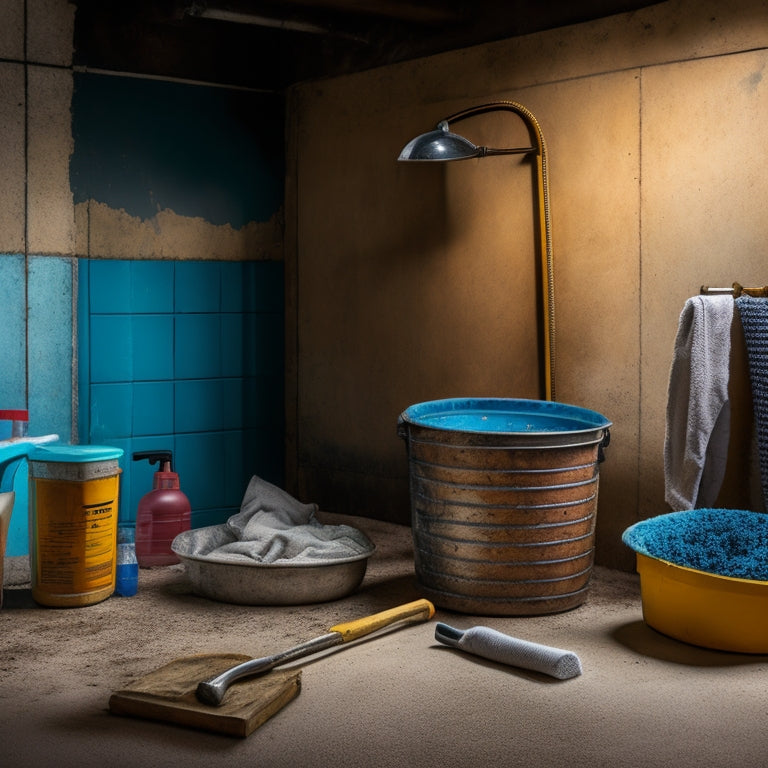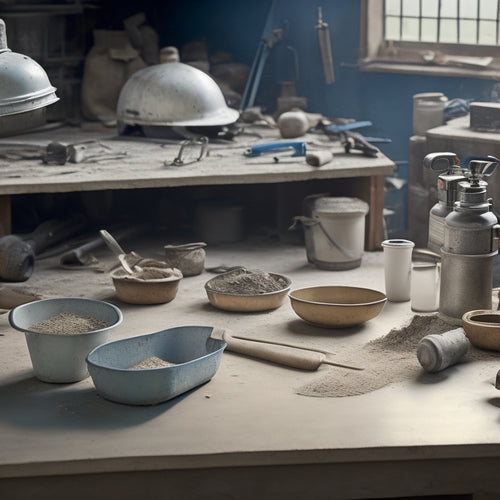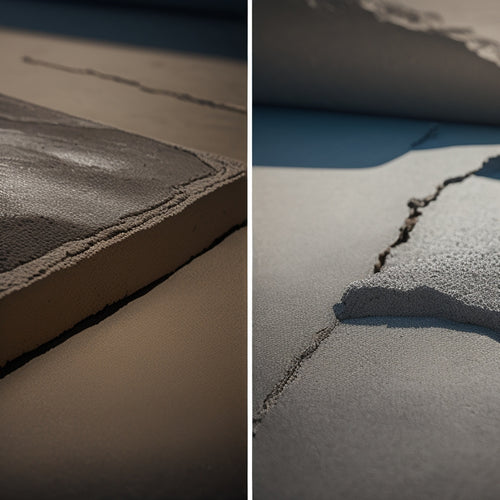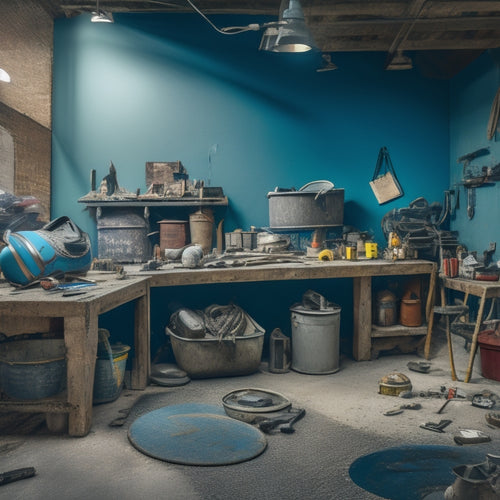
Essential Tools for Indoor Concrete Wall Cleaning
Share
You'll need a range of tools and equipment to effectively clean your indoor concrete walls. Start with specialized brushes, such as nylon or polypropylene bristles, to remove dirt and grime without damaging the surface. A pressure washer with a wide fan tip and low-pressure setting can tackle tough stains, while essential chemicals like etching solutions and pH adjusters prepare the surface for coatings. Don't forget protective gear like gloves, goggles, and masks to guarantee your safety. With the right tools and equipment, you'll be well on your way to a successful cleaning process, and by exploring further, you'll discover the specific techniques and strategies to tackle even the toughest stains and surfaces.
Key Takeaways
• Soft-bristled brooms or dusting brushes are ideal for removing loose debris from cinder block walls before deep cleaning.
• Nylon or polypropylene bristle brushes are durable and resistant to abrasion, making them suitable for cleaning concrete surfaces.
• Pressure washers with low-pressure settings and wide fan tips are effective for removing tough stains on indoor concrete walls.
• Chemical solutions like etching solutions, concrete cleaners, and pH adjusters are essential for preparing concrete surfaces for coating or sealing.
• Protective gear including gloves, goggles, and masks is necessary to ensure safety while cleaning and removing stains from indoor concrete walls.
Cleaning Tools for Cinder Block Walls
When tackling cinder block walls, you'll need specialized cleaning tools to effectively remove dirt, grime, and stains without damaging the surface. Cinder block maintenance requires attention to detail and the right equipment to prevent etching or discoloration.
For effective wall cleaning techniques, start with a soft-bristled broom or a dusting brush to remove loose debris. Next, mix a solution of mild detergent and warm water, and apply it to the wall using a mop or a microfiber cloth.
Avoid using harsh chemicals or abrasive scrubbers, as they can damage the cinder block's porous surface. For tough stains, consider using a pressure washer with a wide fan tip and a low-pressure setting. Always test a small area first to verify the cleaning solution or pressure washer won't damage the wall.
Effective Brushes for Concrete Surfaces
When it comes to cleaning indoor concrete walls, you'll need a brush that can tackle tough dirt and grime.
You'll find that the right brush head material can make all the difference in effectively removing dirt without damaging the surface.
Now, let's take a closer look at the key factors to evaluate, including the importance of brush head materials and the power of stiff bristle brushes.
Brush Head Materials Matter
You'll get the best results from your indoor concrete wall cleaning effort by selecting a brush head made from a material that's specifically designed to tackle the unique challenges of concrete surfaces. This is essential because concrete is a rough and porous material that can be harsh on brushes.
When choosing a brush head, consider the following key factors:
-
Nylon bristles: These are a popular choice for concrete surfaces because they're durable and resistant to abrasion. They're also less likely to scratch or damage the concrete.
-
Polypropylene bristles: These are another good option for concrete cleaning. They're stiff enough to remove dirt and grime, yet gentle enough not to damage the surface.
-
Brush durability: Look for brush heads with high-quality construction and securely attached bristles. This will guarantee that your brush head can withstand the rigors of concrete cleaning and last for a long time.
Stiff Bristle Power Sweep
For tackling stubborn dirt and grime on indoor concrete walls, a stiff bristle power sweep brush is an effective tool that gets the job done efficiently. You'll appreciate the stiff bristle benefits, as they allow for aggressive cleaning without scratching the surface. When using a stiff bristle power sweep, you'll notice it's particularly effective at removing heavy dirt and grime buildup.
To get the most out of this tool, employ power sweep techniques like overlapping strokes and maintaining consistent pressure. This guarantees a thorough cleaning and prevents missing spots. Additionally, adjust the brush head's angle to suit the wall's texture and the type of dirt you're dealing with. For example, use a steeper angle for more aggressive cleaning or a shallower angle for smoother surfaces.
Remember to always work in sections, cleaning one area at a time to maintain control and visibility. By following these techniques and using a stiff bristle power sweep, you'll achieve professional-looking results and a cleaner, healthier indoor environment.
Necessary Pressure Washer Accessories
When you're preparing to clean indoor concrete walls with a pressure washer, you'll need to contemplate the necessary accessories to get the job done efficiently.
You'll want to invest in a wand extension hose, which will give you more flexibility and reach when cleaning hard-to-access areas.
Additionally, having a variety of nozzle tips on hand will allow you to adapt to different cleaning tasks and surfaces.
Wand Extension Hoses
Extending your reach with wand extension hoses allows you to clean hard-to-access areas, such as high ceilings and corners, without straining or using ladders. This is especially important when cleaning indoor concrete walls, where safety and accessibility are vital.
With a wand extension hose, you can reach up to 6 feet further than your standard wand, giving you the flexibility to clean those hard-to-reach areas with ease.
When choosing a wand extension hose, consider the following key factors:
-
Wand flexibility: Look for hoses with flexible materials that can bend and twist to fit into tight spaces.
-
Hose compatibility: Confirm the hose is compatible with your pressure washer's wand and hose system to avoid any connection issues.
-
Pressure rating: Choose a hose that can withstand the maximum pressure of your pressure washer to avoid damage or bursting.
Nozzle Tips Variety
You'll need a variety of nozzle tips to effectively clean different areas of your indoor concrete walls, as each tip is designed to tackle specific cleaning tasks and surfaces.
For instance, a wide fan tip is perfect for cleaning large, flat areas, while a narrow, pinpoint tip is better suited for precision cleaning in tight spaces. You'll also need a range of nozzle types, including zero-degree, 15-degree, 25-degree, and 40-degree tips, each designed for specific pressure settings and cleaning tasks.
When selecting nozzle tips, consider the surface you're cleaning and the level of pressure required. A zero-degree tip, for example, is ideal for blasting away heavy dirt and grime, while a 40-degree tip is better for lighter cleaning tasks.
Be sure to choose nozzle tips that are compatible with your pressure washer's maximum pressure setting to avoid damage or injury.
Essential Chemicals for Block Prep
Before applying any coating or finish, prep your concrete block walls with the right chemicals to guarantee a strong bond and best results.
Chemical selection is vital in surface preparation, and you can't afford to get it wrong. The wrong chemicals can compromise the integrity of your walls, leading to a weak bond and subpar results.
To get it right, you'll need the following essential chemicals:
-
Etching solution: A mild acid-based solution that opens up the concrete's pores, allowing for better adhesion of coatings and finishes.
-
Concrete cleaner: A powerful cleaner that removes dirt, grime, and old coatings, revealing a clean surface for coating or finishing.
-
pH adjuster: A chemical that adjusts the pH level of the concrete surface, ensuring it's neutral or slightly alkaline, which is ideal for coating or finishing.
Protective Gear for Safe Cleaning
Don your protective gear, including gloves, goggles, and a mask, to safeguard yourself against harsh chemicals and debris during the concrete wall cleaning process.
When selecting gloves, opt for those made from durable, chemical-resistant materials like nitrile or neoprene. Look for gloves with a textured palm for improved grip and dexterity.
For your goggles, choose a pair with anti-fog lenses and a snug, secure fit. This will guarantee your vision remains clear throughout the cleaning process.
When it comes to masks, you'll want to select one that provides both dust and chemical protection. There are two primary mask types: half-face and full-face respirators. Half-face respirators cover your nose and mouth, while full-face respirators cover your entire face, including your eyes. If you're working with particularly hazardous chemicals, a full-face respirator is the safer choice.
Specialized Equipment for Tough Stains
When tackling stubborn stains on your indoor concrete wall, it's often necessary to bring in specialized equipment to get the job done. You'll need tools that can effectively remove tough stains without damaging the concrete or the environment.
Here are some essential pieces of equipment to add to your arsenal:
-
Pressure washers: These powerful tools use high-pressure water streams to blast away stubborn stains. Look for eco-friendly solutions that use biodegradable detergents and minimize water waste.
-
Grinding wheels: For more severe stains, a grinding wheel can be used to physically remove the stain. Be sure to wear protective gear and follow proper stain removal techniques to avoid damaging the concrete.
-
Specialized stain removers: There are various stain removers available on the market, each designed to target specific types of stains. Choose eco-friendly solutions that are safe for your indoor environment and follow the manufacturer's instructions for best results.
Frequently Asked Questions
Can I Use Household Cleaners on Indoor Concrete Walls?
You're wondering if you can use household cleaners on indoor concrete walls. While it might be tempting, it's not the best approach.
Household cleaners can be too harsh, potentially damaging the concrete or leaving residues that affect its appearance.
For effective concrete wall maintenance, you'll want to opt for specialized cleaners designed for concrete. These products will guarantee a safe and efficient cleaning process, preserving the integrity of your indoor concrete walls.
How Often Should I Clean My Indoor Concrete Walls?
You're wondering how often to clean your indoor concrete walls. The answer depends on the wall's exposure to dirt and grime.
If your walls are in high-traffic areas or prone to moisture, you should clean them every 1-2 months.
For low-traffic areas, cleaning every 3-4 months should suffice.
Regular cleaning frequency is key to effective wall maintenance. By staying on top of cleaning, you'll prevent dirt buildup and keep your walls looking their best.
Are There Eco-Friendly Options for Concrete Wall Cleaning?
Are you tired of using harsh chemicals to clean your indoor concrete walls? You're in luck! You can ditch those toxic cleaners for eco-friendly options.
Look for biodegradable solutions or natural alternatives like baking soda, vinegar, and lemon juice. These gentle yet effective cleaners will leave your walls sparkling without harming the environment.
Plus, they're often cost-effective and easy to find. Make the switch to a greener cleaning routine and breathe easier knowing you're doing your part for the planet.
Can I Mix Different Cleaning Chemicals for Better Results?
When mixing different cleaning chemicals, you're taking a risk.
Chemical interactions can be unpredictable, and incompatible combos can reduce cleaning efficiency or even create hazardous reactions.
Before blending, research the ingredients and verify they're compatible. It's better to stick with a single, reliable product or consult a professional if you're unsure.
You want to achieve sparkling clean walls, not compromise your safety or the environment.
Do I Need to Seal My Concrete Walls After Cleaning?
You're wondering if you need to seal your concrete walls after cleaning, and the answer is, it depends.
But let's cut to the chase - sealing can be a game-changer. It protects your walls from stains, makes future cleaning a breeze, and even enhances their appearance.
You've got options for sealing techniques, from acrylic to epoxy-based products.
Conclusion
You've finally made it through the grueling process of cleaning your indoor concrete wall. Congratulations! You probably can't wait to get back to the fun part - gazing at those sparkling clean walls.
But let's be real, you know it's only a matter of time before they're covered in dirt and grime again.
So, keep these essential tools handy, because you'll be back at it sooner than you think.
Related Posts
-

What Tools Do You Need for Concrete Success
For concrete success, you'll need a range of essential power tools, including rotary hammers, angle grinders, concret...
-

What Tools Ensure Strong Concrete Adhesion at Home
You'll need the right tools to guarantee strong concrete adhesion at home. For surface preparation, use concrete surf...
-

What Tools Do You Need for Concrete Flooring
You'll need a thorough arsenal of specialized tools to achieve a high-quality, professional-looking concrete floor, i...


